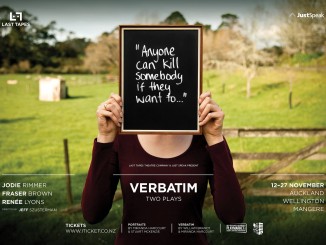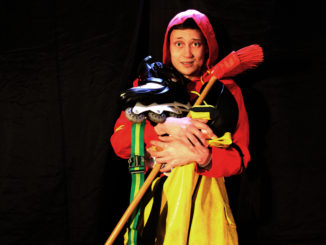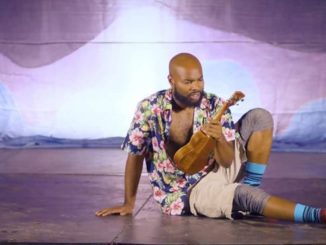
[Holding Leaders to Account]
April 20, 2021:
- An Air New Zealand cleaner tests positive for Covid-19, despite being fully vaccinated.
- Epidemiologist Professor Michael Baker calls for an elimination strategy to be pursued against poverty-driven health conditions.
- Prime Minister Jacinda Ardern attends the premiere of Transmission at BATS Theatre.
While the 1918 Influenza pandemic shattered families and social life, ultimately infecting 1/3 of the world’s population and counting a higher death toll than WWI, the influence on the period’s arts and culture is less overtly visible. “Artists struggled to visualise” the impact of pandemic – one reason that the 1918 pandemic had faded in the world’s historical memory. However, critics have pointed towards the absurdism of the Dada movement and the minimalist design from the Bauhaus School as artistic responses emerging from the pandemic.
With Covid-19 having shifted our consumption of art, at least temporarily, the question is what kind of long term effect this 21st century pandemic will have on the content and form of our art.
How, for example, do you make theatre about the pandemic? Is it a subject audiences want to see, are eager to relive? Or with the story still unfolding, is it still too early to try to make sense of it all? Or are we instead hungry for theatre of escapism, comfort, community, relief, joy? Or are we drawn with renewed urgency to examining all those existing social ills that Covid so ruthlessly exposed?
Aotearoa’s theatremakers have been in the comparatively enviable position of actually being able to grapple with these questions around what kind of theatre they want to bring to a live audience during this Covid-19 epoch.
Transmission is the *third* play that I have seen at BATS’ Random Stage *alone* that directly dramatises Aotearoa’s first 2020 lockdown. Both Pre Lockdown Post, from Hone Kouka and Toi Whakaari, and Somethings Starting to Stink (Brick Haus Productions) took a montage approach, mixing extracts from Government press conferences with a host of fictional characters experiencing lockdown.
Transmission’s point of difference is the direct access the show’s creators had to the movers and shakers of Aotearoa’s “go hard, go early” pandemic response: Prime Minister Jacinda Ardern, Finance Minister Grant Robertson, and Epidemiologist Professor Michael Baker. Co-Directors Stuart McKenzie and Miranda Harcourt interviewed these prominent figures, along with TVNZ journalist Mei Heron and Moira Sai’moa, whose mother died during lockdown. The 20 hours worth of transcripts from these interviews form the basis of McKenzie’s verbatim script for the play. That’s the other selling point – Harcourt and McKenzie’s status as experienced practitioners of the verbatim/documentary theatre form. The production sold out before it opened, and will now be livestreamed (thankfully not due to any alert level changes).
We begin with a warning of what might have been: without intervention, the health system would be inundated – 10,000 New Zealanders will die. Lifted direct from a PM press conference, the text is delivered in serious tones by Tom Knowles. But he’s quickly interrupted – “Are you meant to be Jacinda?” Tim Spite thinks he can do a better job, clasping his hands and pumping his fingers to get into character and make prime ministerial points. Sophie Hambleton then steps in to show how its done: direct, empathetic, earnest, crystal clear – a masterclass in political communication.
It’s a playful premise for a heavy subject, allowing the playwright (who also speaks – via the actors) to outline the verbatim conceit of the show: what the actors say in the show was really said by the subjects. The ridiculousness of the opening scenario (would the actors really compete to play Jacinda?), strains credibility, undercutting the authenticity of what is follow.
The actors settle in to their main casting – Hambleton as Ardern, Knowles as Grant Robertson, and Spite as Professor Michael Baker. Designer Mark McEntyre has set at their disposal alert level yellow painted boxes – the multipurpose set piece beloved of high school drama devising – to create seats and podiums as needed. Two moveable side screens are used for images, video and a timeline reminding us of the major milestones of Aotearoa’s evolving pandemic response. The back wall is also utilised for widescreen projection, with images of microscopic coronavirus transformed into abstract art (AV Designer Robert Larsen).
It is the perspective of the expert, Michael Baker, that comes to the foreground in the first part of the play. Spite discovers in the character the makings of a tragic hero, up against accepted opinion and becoming plagued by his own self-doubt. The would-be Cassandra, looking to events in China and Italy, can see where the coronavirus’s replication rate could take us in NZ. Shut the schools, he argues, a lone voice in the wilderness. We cut to Mei Heron (played by Michelle Ang via prerecorded video), who describes an interview where Baker broke down, overwhelmed by the potential peril facing us. Alongside Baker’s maneuvering in the press and behind-the-scenes channels to influence Government policy, the choice to focus on this event in the interview, with Spite choking tears in the darkness, reveals McKenzie and Harcourt’s interest in humanising the figures behind the headlines.
Ardern and Robertson discuss the origins of the alert level system, and the decision to address the nation to introduce them to us. Baker interrupts with a forceful “no” – a charged dramatic moment made all the more tense on opening night due to the audience’s acute awareness that the real Jacinda, Grant and Michael were also watching from the audience. Baker thinks the levels are wrong way round – you don’t ramp up to level 4, you need to start there. McKenzie allows Ardern to comment and defend, explaining the political calculations that “Michael doesn’t need to think about.”
The Rashomon effect of layering the verbatim accounts is most intriguing around the decision to enter lockdown. Baker working to get his advice through but not hearing any encouraging responses. Ardern sitting through a “patronising” call from business leaders. Robertson cheerily adamant they had already decided New Zealand would need to go into lockdown, but the public would need to be “socialised” with the news first. While Baker’s verbatim account questions his ultimate influence, the play’s narrative makes the case that he helped turn our history, good science eventually meeting receptive political leadership.
This is all compelling, revelatory, drama, placing us in a tense zone where we might imagine how events might have taken a grimmer path if different actions were taken or different leaders had been in place. But once the lockdown decision has been examined, Transmission struggles to find a dramatic through line to carry it through the rest of its 90 minute running time. McKenzie’s interest turns to trying to understand Jacinda and Grant, how they felt about what they had to do, the formative experiences that impacted their choices, the “be kind” philosophy of their Labour Government.
So we get Robertson covering similar terrain to his recent North & South profile, including his relationship with his father, who was sent to prison for fraud. He talks up the wellbeing budget, and complains how the media sensationalise the economy. He rejects McKenzie’s attempt in the interview to link his approach as Finance Minister as a redemption arc influenced by his father.
Ardern insists on her ordinariness – “I go to Kmart like everyone else”, and we are offered glimpses of family life. The most candid story from Ardern is when she is asked when in her life she was closest to dying. We feel like we have learnt a new insight from Ardern in what she shares, and the real Ardern seemed to feel she had offered to much, asking McKenzie “please don’t use that about that.” McKenzie says he won’t, “Trust me.” It is unclear if permission to use this part of the transcript was retroactively sought, but the ethics of it leaves me feeling uneasy.
Its illustrative of the fundamental tension in Transmission’s focus: politicians, at least while they are still in power, are hardly going to divert from the party line. The one story where Ardern gets very personal, she doesn’t want the playwright to use. In the story of Covid, politicians are perhaps not ultimately the most interesting people for us to hear from (we get a brief vision of what a USA Trump version of this play might look like – with a series of clips from the Covid deniar-in-chief). Nor do we need a play to humanise them – there are plenty of non-Mike Hosking media that allows them to do that (not to mention Facebook Live), an essential aspect of the contemporary political game. Ardern and Robertson’s rhetoric of supporting the most vulnerable in society is allowed to go unscrutinised. There’s potential for a more critical examination of political power and the tactics used to appeal to the team of 5 million, but too often I felt I was watching Labour party propaganda.
There is a counter point offered by Mei Heron, describing the backlash journalists faced when they were asking critical questions of Ardern and ‘saint’ Ashley Bloomfield, but we feel the absence of not having Michelle Ang live in the same room as the other actors. Lahleina Faunati makes a late entrance as Moira Sai’moa, representing all those who were unable to hold funerals as normal under lockdown. Used as Transmission’s cathartic climax, Faunati has to do a great deal of emotional and cultural heavy lifting – adding her voice consistently throughout the play may have added a much needed perspective of someone removed from the levers of power. Indeed, Transmission may have benefitted from a wider range of interview subjects. The perspective of tangata whenua on the pandemic response is Transmission’s most glaring oversight.
Although Transmission’s lens remains narrow, and the play often teeters over to a congratulatory Covid narrative of Aotearoa exceptionalism, the doco-theatre approach provides an opportunity to remember what was achieved through the first lockdown (and how easily it all might have gone a very different way), and what we, with will and effort, might also be able to achieve – like Baker’s elimination call for poverty-related diseases.
Meanwhile, despite the blue skies and sing-along ending of Transmission, the Covid story locally and globally is far from over. If there are to be great Covid-related plays that emerge from the pandemic, I feel confident in saying that the great Covid plays will not come from Aotearoa New Zealand. And that – touch wood – is this country’s great blessing.
Transmission plays BATS Theatre 20 April to 2 May, 2021. See BATS for LiveStream information.
SEE ALSO: Theatreview review by John Smythe, and TheSpinoff review by Adam Goodall.




Leave a Reply